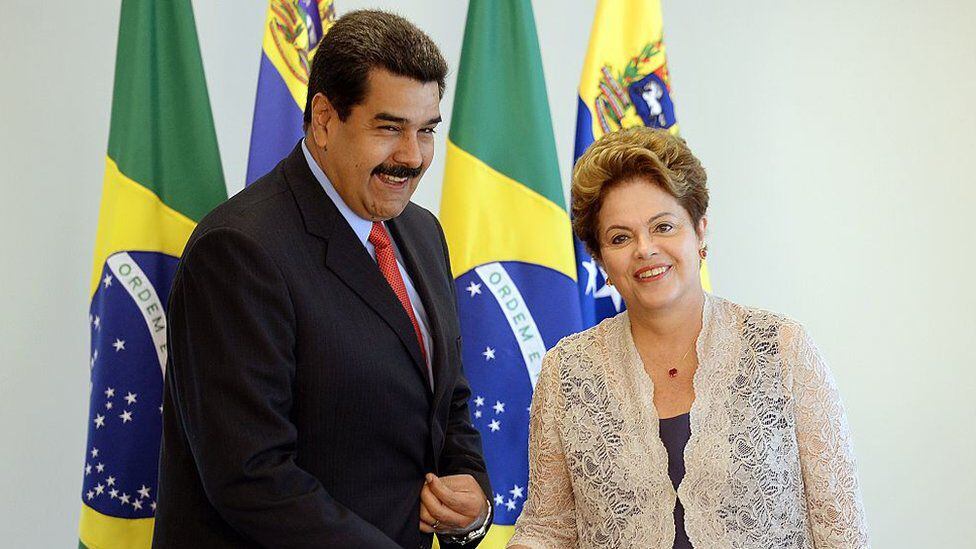After eight years and four months without setting foot in Brazil, the president of Venezuela, Nicolas Maduroit’s back.
The president was received this Monday by his Brazilian counterpart, Luiz Inacio Lula da Silva, in the capital Brasilia. The image of the meeting between the two leaders went around the world, marking the resumption of relations between neighboring countries.
LOOK: “While they were kneeling, they gave them electric shocks”: the harsh testimonies of the mass incarceration decreed by Bukele
Maduro arrived with his wife, Cilia Flores, to participate in a summit with other Latin American leaders that will take place today and whose purpose is to strengthen the integration of the region.
But before attending that meeting, the Venezuelan president – who has been accused of serious human rights violations by the United Nations (UN) – took advantage of a bilateral meeting with his Brazilian counterpart at the Palacio de Planalto, the seat of the Executive power.
After that, the Chavista president said that a “new era” in bilateral relations between both nations.
The Brazilian president, meanwhile, indicated that they were recovering “the right to make our foreign policy with the seriousness that we always had, especially with the countries that share borders with Brazil.”
The last time Maduro had visited Brazil was in January 2015, when he was received by former president Dilma Rousseff.
Jair Bolsonaro then took power in 2019 and severed relations with the Venezuelan government, recognizing opposition figure Juan Guaidó as that country’s interim president and barring Maduro from entering his country.
“It is difficult to conceive that so many years have gone by without holding dialogues with the authority of a neighboring Amazonian country, with which we share a long 2,200-kilometer border,” Lula said.
In addition, he added that the accusations of authoritarianism against Venezuela are only “narratives” and took the opportunity to criticize the United States sanctions, describing them as “grossly exaggerated”.
“You know the narrative that was built against Venezuela. From anti-democracy, from authoritarianism… So I think it’s up to Venezuela to show its narrative, so that it can effectively change people’s minds,” he said.
According to the Brazilian president, the prejudice against Venezuela “is very great” and continues to exist.
Additionally, both rulers spoke of the need to strengthen security on the border, increasing cooperation in the fight against drug trafficking and other crimes. They also advocated reactivate commercial relations, which in 2022 reached approximately US$1.7 billion.
Controversy after the match
Lula’s statements, and his meeting with the Venezuelan president, generated various reactions.
While his supporters defend him saying that it is important to reestablish relations with a country like Venezuela, his critics questioned him for not having alluded to the complaints about human rights violations in the neighboring country.
For them, Lula is “supporting a dictator”.
Through his Twitter account, the right-wing senator, Sergio Moro, pointed out that “Brazil once again received South American dictators with state honors, this time Maduro. Another negative signal for the international community from the Lula government. Will the dictator be asked to restore democracy and rights? humans in Venezuela?
Entities such as Amnesty International, Human Rights Watch and the United Nations (UN) accuse the government led by Maduro of being a dictatorship that uses violence to stay in power.
The methods would include executions, kidnappings, rapes, and arrests of opponents. Started by Hugo Chavez, Maduro’s political group, Chavismo, has been in power in Venezuela without interruption since 1999.
According to the entities, the government would use the civil and military intelligence apparatus to monitor civil society, including trade unionists and members of the press.
On the other hand, the long political and humanitarian crisis in Venezuela has caused some seven million people flee the country since 2015.
Venezuela has been locked in a downward spiral for years with growing political discontent further fueled by skyrocketing hyperinflation, power outages and food and medicine shortages.
The Maduro administration has said the accusations against him are part of an international smear campaign.
Brazilian “tradition”
For the expert academic in International Relations at the Federal University of São Paulo, Carol Pedroso, Lula’s rapprochement with Maduro obeys a Brazilian tradition of seeking relations with all countries, even with those that are considered dictatorships.
“There is a tradition in Brazilian diplomacy, consolidated at the beginning of the 20th century, that Brazil does not take a position vis-à-vis the governments. Brazil (…) does not directly criticize the internal situation of other States. The understanding is that if we (Brazil) take a position on the internal issues of another country, we also put ourselves in a position to receive criticism from others,” the researcher explained to BBC News Brasil.
“And since Nicolás Maduro is the de facto president of Venezuela, the one who really governs the country, the one who controls the institutions, he must be received as head of state,” he adds.

The academic, however, acknowledges that “the reception of Maduro with honors as head of state weighs against Lula, especially in the internal sphere (of Brazil)”, due to the accusations he has for human rights violations.
On the other hand, Carol Pedroso believes that Lula’s rapprochement with Maduro may be related to the Brazilian’s attempt to get the Venezuelan regime to negotiate again with the opposition.
“Lula can (try) to gain international projection as a mediator, just as it is trying to do in the case of the conflict in Ukraine. We know that he personally has a great negotiating capacity, but the current conditions (in Venezuela) are very different from those of his first two governments, ”he affirms.
Source: Elcomercio
I am Jack Morton and I work in 24 News Recorder. I mostly cover world news and I have also authored 24 news recorder. I find this work highly interesting and it allows me to keep up with current events happening around the world.

:quality(75)/cloudfront-us-east-1.images.arcpublishing.com/elcomercio/CSZA37IFL5CZTGNTKVCFYOWGBQ.jpg)

:quality(75)/cloudfront-us-east-1.images.arcpublishing.com/elcomercio/4DTDOVLGRRD7TD2VGI35N425M4.jpg)

:quality(75)/cloudfront-us-east-1.images.arcpublishing.com/elcomercio/CQHJETRMBBBUVA4Z4TKJP5LEGM.jpg)

